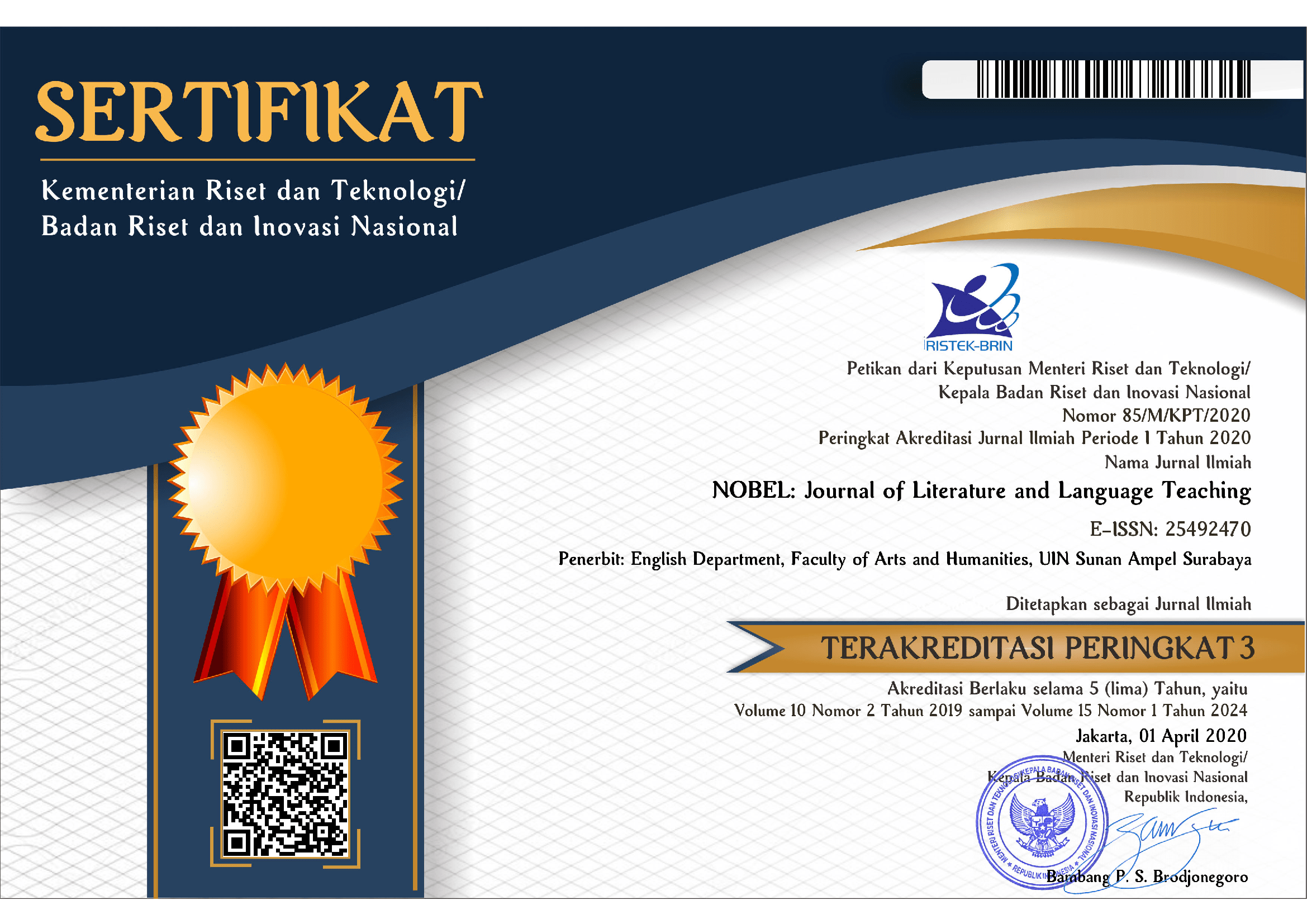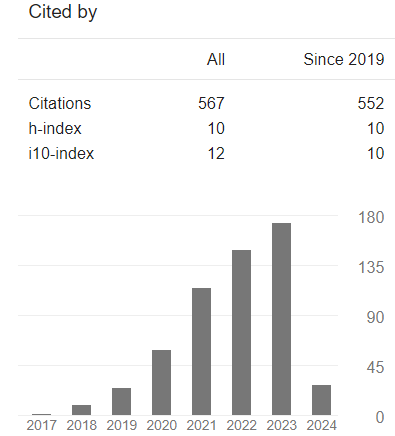Apology Strategies Expressed by the Characters in The Proposal Movie
DOI:
https://doi.org/10.15642/NOBEL.2016.7.1.1-14Keywords:
apology; apology strategies; functions of apologies; politeness; The Proposal movieAbstract
This research is based on the fact that mistake may occur in human interaction. To minimize its effect, the interlocutor needs to apologize to his/her counterparts. This research focuses on the apology strategies, namely the ways of expressing apologies and the social functions of the apologies in “The Proposal†movie. Descriptive research is applied to investigate the phenomenon of apology. The data were verbal and nonverbal apology expressions taken from the English transcript of the movie. The researcher found 32 data containing apology expressed by the characters. An expression of regret comes as the dominant strategy, direct apologies are expressed more than the indirect ones and assuaging the addressee's wrath is the most dominant function of the apologies. Even though making mistakes or offence is unavoidable in human communication, by expressing an apology, the speaker will be able to minimize its effect, solve the problem, and restore the threatened relationship.
Downloads
References
Banikalef, et al.. (2015). Apology Strategies in Jordanian Arabic. Journal of Language Studies, Vol.15 (2), 83-99.
Brown, P. & Levinson S.C. (1987). Politeness: Some Universals in Language Usage. Cambridge: Cambridge University Press.
Chamani, F. & Zareipur, P. (2010). A Cross-Cultural Study of Apologies in British English and Persian. Studies in Linguistics, 36.1, 133-153.
Chandra, S.S. & Sharma, K.R. (2007). Research in Education. India: Atlantic Publishers & Distributors (P) LTD.
Chunlin, Y. (2013). Males and Females in Making Apologies in Chinese Daily Conversations: the Differences and the Similarities? International Journal of Social Science and Humanity, Vol. 3 No. 3, 268-273.
Cutting, J. (2002). Pragmatics and Discourse. New York: Routledge.
Dementer, G. (2006). A Pragmatic Study of Apology Strategies in Romanian. (Thesis, University of Oklahoma, 2006).
Fitriani, N. (2012). Apology Strategies: Are Women’s Different from Men’s? Retrieved June29, 2009 from http://repository.perbanas.id/xmlui/bitstream/handle/123456789/378/Nani_Fitriani_APOLOGY_STRATEGIES.pdf?sequence=1
Ghanbari, et al.. (2014 November 27-28). Investigating Apology Strategy among Male and Female Kurdish Bilinguals at Ilam. Paper presented at 2nd Global Conference on Psychology Researches. Iran.
Halliday, M.A.K. & Hassan, R. (1985). Language, Context, and Text: Aspects of Language in Social-Semiotic Perspective. Hongkong: Oxford University Press.
Holmes, J. (1992). An Introduction to Sociolinguistics. UK: Longman Group Ltd.
Ilmah. K. (2015). The Acts of Apology Strategy used by the Characters in the “Stuart Little 2†Movie. (Thesis, State Islamic University Sunan Ampel Surabaya, 2015).
Juhana. (2011). The Use of Apologizing Speech Acts Realization by Male and Female Students. Ragam Jurnal Pengembangan Humaniora, Vol.11, No 1, 1-10.
Leech, G.N. (1983). Principles of Pragmatics. New York: Longman.
Majeed, A. & Janjua, F. (2014). Apology Strategies and Gender: A Pragmatic study of apology speech acts in Urdu language.Merit Research Journal of Education and Review, Vol.2 (3),054-061.
Nikmah, M.T. (2012). Analysis of Apology as a Politeness Style of Expressed by the Characters in the Twilight Saga Movie (Thesis, State Institute of Islamic Studies Salatiga, 2012).
Norrick, N. R. (1978). Expressive Illocutionary Acts. In: Anna Trosborg,Interlanguage Pragmatics; Request, Complaints and Apologies (376).New York: Mouten de Gruyter.
Olshtain, E. and Cohen A.D. (1983). Apology: A speech Act Set. In: Nessa Wolfson and E. Judd (ecls), Sociolinguistics and Language Aquisation. Rowley (22-23). MA: Mewbury House.
Riyani, I.D. (2010). Apology Strategies Used By the Characters of Joe Wright's Pride and Prejudice Movie. (Thesis, State Islamic University Maulana Malik Ibrahim, 2010)
Searle, John R. 1969. Speech Acts: An Essay in the Philosophy of Language. Cambridge: Cambridge University Press.
Shariati, M. and Chamani, H. (2010). Apology Strategies in Persian. Journal of Pragmatic. 42, 1689-1699.
Soesilowati, R. (2009). An Analysis Of Apology As A Politeness Strategy Expressed By The Characters In The Film Entitled “Chasing Liberty (Thesis, Sebelas Maret University Surakarta, 2009).
Trosborg, A. (1995). Interlanguage Pragmatics; Request, Complaints and Apologies. Berlin; New York: Mouten de Gruyter.
Wolfson, N. and Judd, E. (1983). Sociolinguistics and Language Acquisition, Rowley MA: Newbury House Publishers Inc.
Yi, L. (2006). A Comparison of Apology Strategies in Chinese and English. (Thesis, University of Hongkong, 2006).







